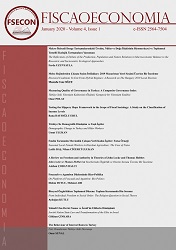Testing the Slippery Slope Framework in the Scope of Fiscal Sociology: A Study on the Classification of Income Levels
Testing the Slippery Slope Framework in the Scope of Fiscal Sociology: A Study on the Classification of Income Levels
Author(s): Rana Dayioğlu ErulSubject(s): Political economy, Fiscal Politics / Budgeting, Sociology of Politics, Socio-Economic Research
Published by: Ahmet Arif Eren
Keywords: Slippery Slope Framework; Fiscal Sociology; Tax Compliance; Socio-Economic Variables;
Summary/Abstract: The purpose of the study is testing the hypothesis of the slippery slope framework which is "power of authorities and trust in authorities explain tax compliance". Trust in authorities and power of authorities are the two main variables of the theory and in this study, other social, cultural and economic variables that affect tax compliance are included to measure the effects of socio economic variables on tax compliance. In the study, the countries are classified according to their income levels and the data for the period 2007-2017 are analyzed by panel data method. As a result, research suggests that power of authorities and trust in authorities have the most significant impact on tax compliance and additionally the study finds evidence for the assumptions of the slippery slope framework.
Journal: Fiscaoeconomia
- Issue Year: 4/2020
- Issue No: 1
- Page Range: 61-93
- Page Count: 33
- Language: English

